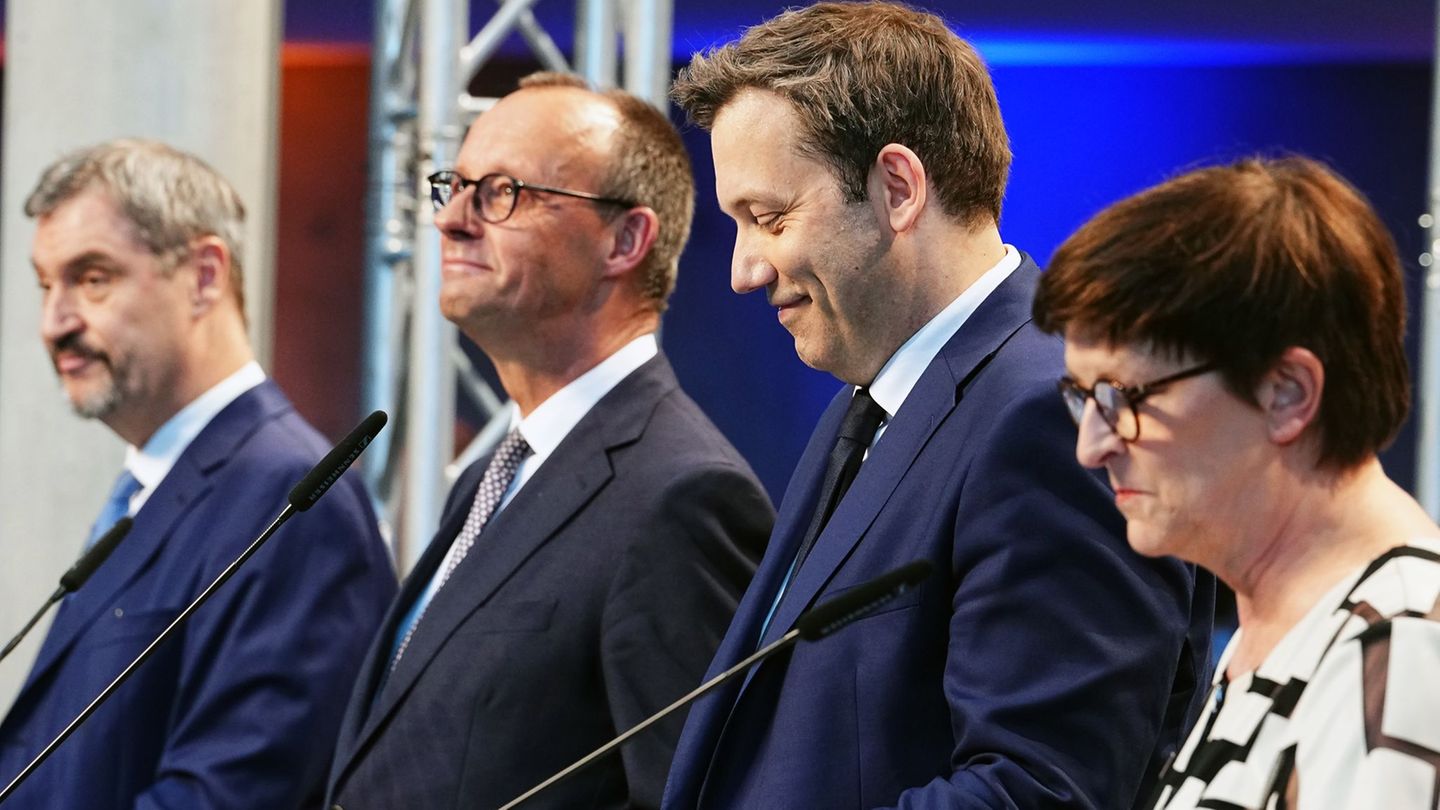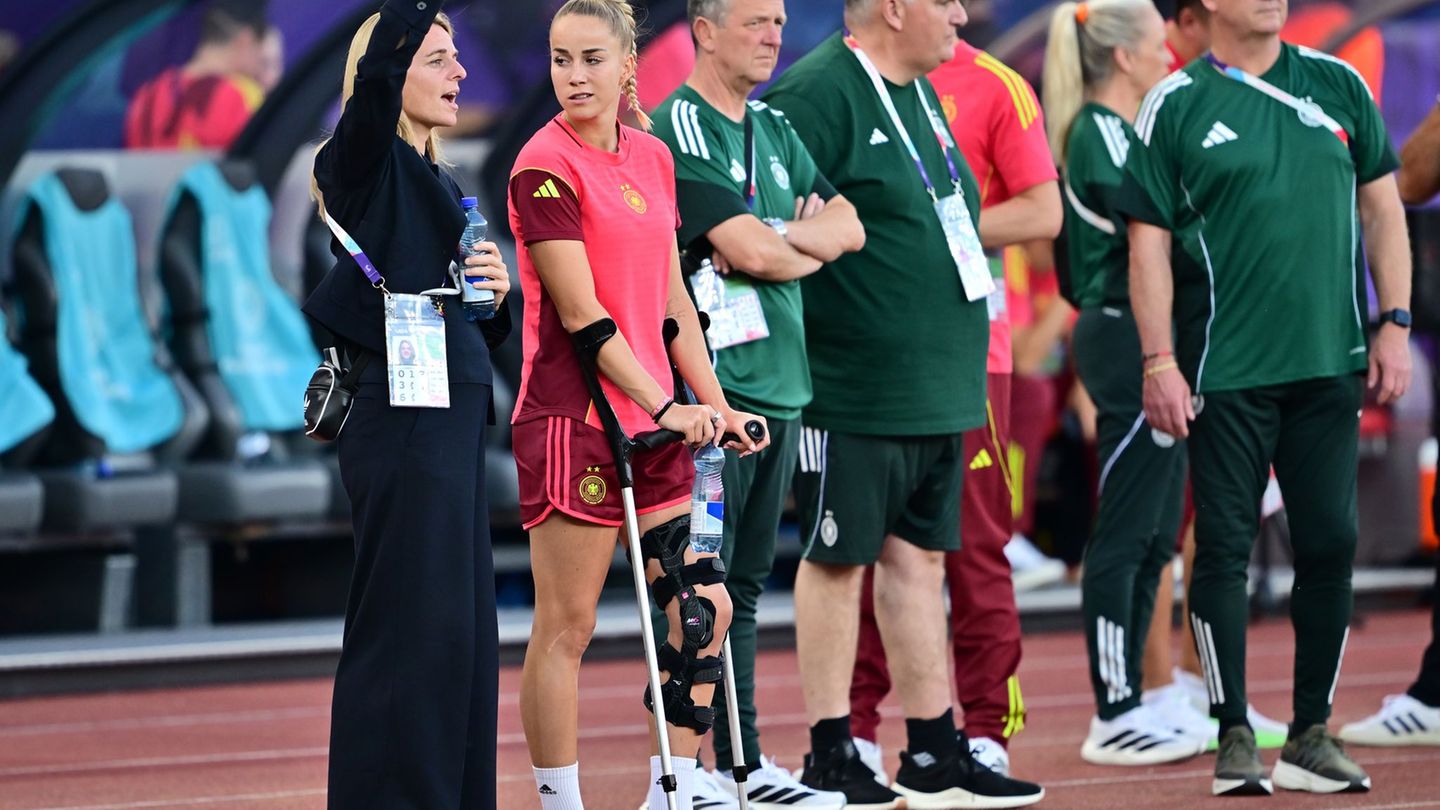Black-red coalition
Union and SPD clear for a common government
Copy the current link
Add to the memorial list
The coalition negotiations from the Union and SPD took almost exactly four weeks. Now it is clear: there will be something with the next black and red government. Pressure also came from outside.
Germany has a federal government from CDU, CSU and SPD for the fifth time in its history. Almost seven weeks after the early Bundestag election, the three parties agreed under the pressure of a rapidly changing security and economic situation in the world and a further strength of the AfD on a coalition agreement.
The 144-page paper with the heading “Responsibility for Germany” also regulates the distribution of the ministries. A ministry for digitization and state modernization is planned for the first time.
All agreements are subject to the fact that the contract is also approved by the three parties. The SPD wants to get a vote of its members. In addition, a financing reservation applies, so the necessary money must also be there for the project.
Merz promises powerful government
“Germany gets a capable of action and a strong government,” said the probably future Chancellor Friedrich Merz (CDU). The coalition agreement is a departure signal and a powerful sign for Germany that the political center is able to solve the problems. “The future government, the future coalition will reform and invest to keep Germany stable, make it safer and to make it economically stronger again.”
Coalition agreement in response to the problems of time
The SPD chairman Lars Klingbeil emphasized: “The starting point was difficult, but the result is impressive.” Klingbeil pointed out the current crises and emphasized: “We have the potential to emerge from this time.”
CSU boss Markus Söder admitted that you had to drill a thick board. “What is now available can not only be represented well, but I think it is an answer to the problems of our time.” He was “convinced in terms of content” by the agreement. The coalition agreement is a mixture of “rehabilitation cure and fitness program for our country”.
Relief for citizens
The agreement between the Union and the SPD provides for relief for the citizens. For example, the income tax for small and medium -sized incomes should be reduced to the middle of the election period. The controversial solidarity surcharge should remain unchanged. Strict -making citizens and companies must continue to pay the special levy to finance reunification.
Commuters should also be relieved for tax purposes. From 2026, the commuter flat rate should be 38 cents from the first kilometer. The flat rate for the first 20 kilometers from the apartment to work is currently 30 cents per kilometer. You can only start 38 cents from the 21st kilometer.
Relief for companies
To relieve companies, tax depreciation rules should first be adjusted, after which corporation tax is to decrease. For the years 2025, 2026 and 2027, a degressive depreciation of 30 percent should apply to equipment investments. This enables companies to write off a higher percentage of their investment costs annually than before – and thus refinance them faster. From 2028, corporation tax should then decrease gradually – five times each by one percentage point.
Energy -intensive companies are to be relieved with an industrial flow price. The electricity tax should fall to the European minimum rate.
The economy will also be pleased with the planned abolition of the German supply chain law, because this does not require reporting obligations.
Union and SPD want to legally fix the current pension level of 48 percent by 2031. Without legal interventions, it would decrease in the coming years because, due to the aging of society, less and fewer and fewer pensioners are coming. The billion dollar costs, which result from a fixation of the pension level, want to compensate for the CDU/CSU and SPD from tax funds.
In 2026, an “early start pension” is to be introduced. For every child from the age of 6 to the age of 18, which attends an educational institution in Germany, ten euros per month should flow into an individual, capital -covered and privately organized retirement pot.
Nothing should change at the retirement age – the age limit should continue to increase gradually to 67 years. A discount -free pension after 45 years of contribution should remain possible in the future.
Future parents should receive a higher parental allowance – the minimum rate of currently 300 euros and the maximum rate of 1,800 euros should be increased. The Union and the SPD also want to create a legal right to maternity protection for independent women who give birth to a child. It is also planned that the federal government should invest massively in daycare centers.
According to the will of the future coalition partners, the previous citizen benefit is to be redesigned into a new basic security for those seeking employees. Placement in work should have priority in work capable of work. The elimination of mediation hurdles is planned. Duty to cooperate and sanctions should be exacerbated in the sense of the principle.
There should be sanctions faster than today. Services can be completely withdrawn if people who can work repeatedly refuse reasonable work. Property gentle days for assets are to be abolished, the amount of the gentle assets should be linked to life benefit. In the future, the Union and SPD does not want to take the price and wage development into account as soon as before.
It was agreed to make rejections at the common limits in coordination with the European neighbors. However, asylum law should be preserved.
The naturalization accelerated by the traffic light after three years for particularly well integrated immigrants is abolished again. Refugees with limited protection status should be allowed to bring relatives to Germany for two years.
In order to increase internal security, the Union and SPD want to oblige the telecommunications providers to store IP addresses for possible investigations for three months in the future.
As part of their limited jurisdiction, the federal police should be allowed to apply the so-called source TKÜ to combat serious crimes. Encrypted communication is monitored directly on the end device.
Union and SPD want to significantly increase the defense spending by the end of the election period. They want to clear the way to the introduction of modern military technology and also expand Germany’s defense ability in space. It was also agreed to create a “military service model based on voluntariness” for the Bundeswehr.
It is also planned to establish a national security council that is intended to bundle information about crisis situations and enable faster decisions.
Distribution of the ministries
The CDU will fill six departments in the new federal government. In addition, there is the head of the Chancellery, which will also have a ministerial rank. The SPD places the management in seven and the CSU in three departments. For the first time in almost 60 years, the CDU will take over the Foreign Ministry again. The new Ministry of Digitization and State Modernization also goes to the CDU. With defense, finance as well as the environment and climate protection, the SPD receives important key departments.
Parties had to cut back
All three parties had to cut back on their positions in the negotiations. Example CSU: In the election campaign, Söder had made many clear demands – and pulled a red line in migration. Now it turns out: The Christian Socialists could not enforce their wishes everywhere. In the CSU, increasing the commuter flat rate, the final stage of the mother’s pension, the end of the heating law, tax cuts, especially in the area of gastronomy, is likely to be well received.
For this purpose, however, the CSU had to bury its demand for a return to nuclear energy as well as a fundamental reform of the fundamental right to asylum and another inheritance tax. In some points, for example in the case of rejections at the borders or in the reform of the financial equalization, the final implementation must be waited for, just as in the non-implemented abolition of the Cannabis Act.
Opposition criticizes the coalition agreement sharply
The opposition parties tore off the agreement of the Union and SPD. AfD boss Alice Weidel said of a “captain of the captain by Friedrich Merz”. “The paper continues to carry the handwriting of the loser voter SPD, peppered with bows and craftsman in front of the Greens.” The criticism of the left was similarly sharp. “This coalition of ignorance and hopelessness presents itself completely discouraged, imaginative and without social compass,” said party leader Ines Schwerdtner.
Green boss Felix Banaszak said that none of the current crises had the possible coalitioners “even the touch of an answer”. BSW founder Sahra Wagenknecht also complained: “The coalition agreement does not give an answer to the economic crisis and trade war.” For the FDP politician Christian Dürr, it is clear: “Germany will be ruled in the future.”
Fifth black and red alliance since 1949
The new coalition has been the fifth black and red government alliance since the Federal Republic was founded. For the first time from 1966 to 1969 under CDU Chancellor Kurt Georg Kiesinger, such a constellation. After the 2005, 2013 and 2017 federal elections, Chancellor Angela Merkel (CDU) each led a black and red coalition.
The previously common name “Grand Coalition” no longer fits. In the Bundestag election on February 23, the AfD (20.8 percent) behind the Union (28.5 percent) had become the second strongest force. At 16.4 percent, the SPD was only in third place.
Government formation only in May
CDU boss Merz had originally issued a government formation up to Easter as the goal. However, this schedule is no longer to be kept. Now he called the first May week. May 7th is under discussion as the date for the chancellor’s election.
Before that, all three parties want to have their agreement approved within the party. The SPD will make a member survey. The CDU is planning a small party congress on April 28th. Only one board decision is planned for the CSU.
dpa
Source: Stern
I have been working in the news industry for over 6 years, first as a reporter and now as an editor. I have covered politics extensively, and my work has appeared in major newspapers and online news outlets around the world. In addition to my writing, I also contribute regularly to 24 Hours World.




